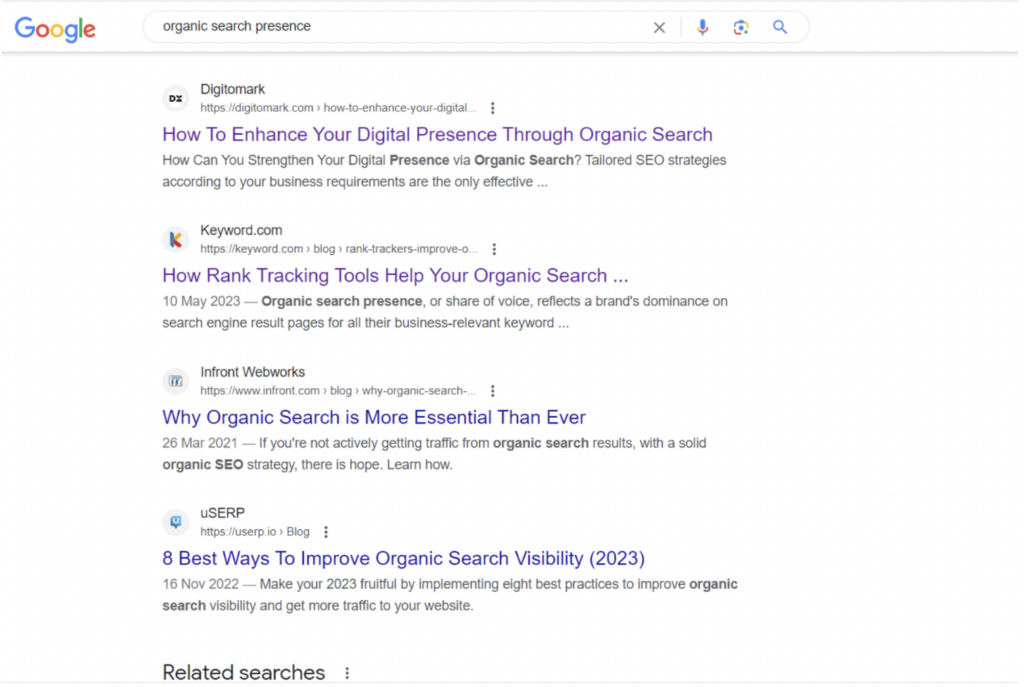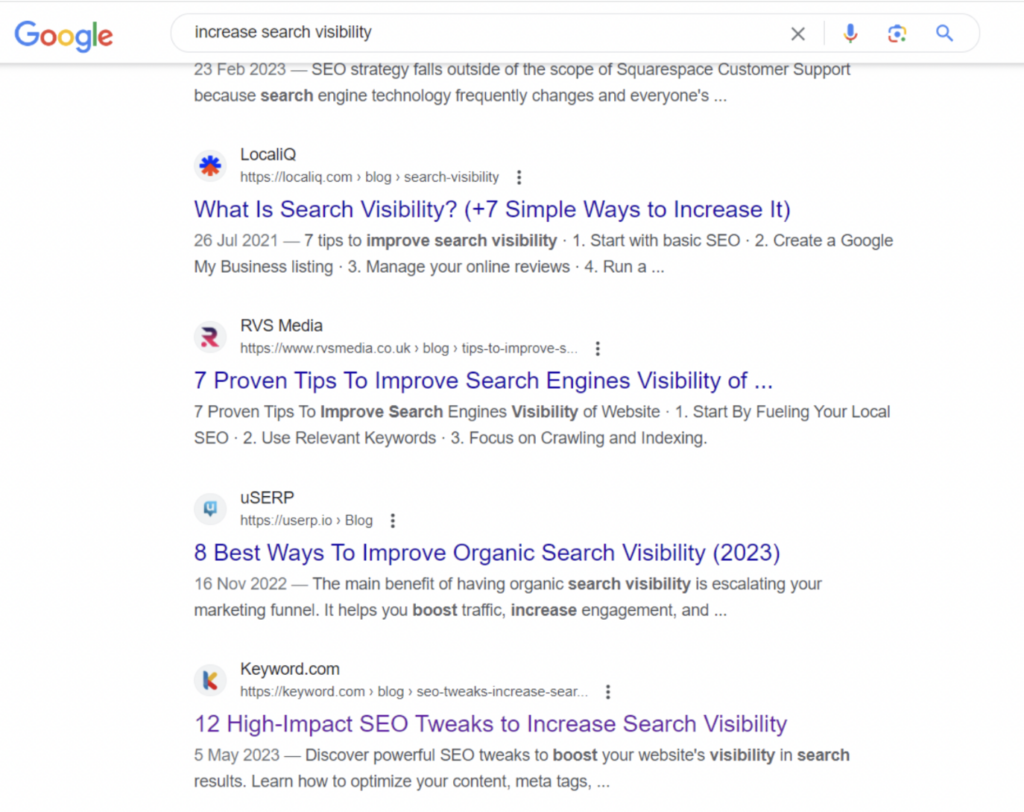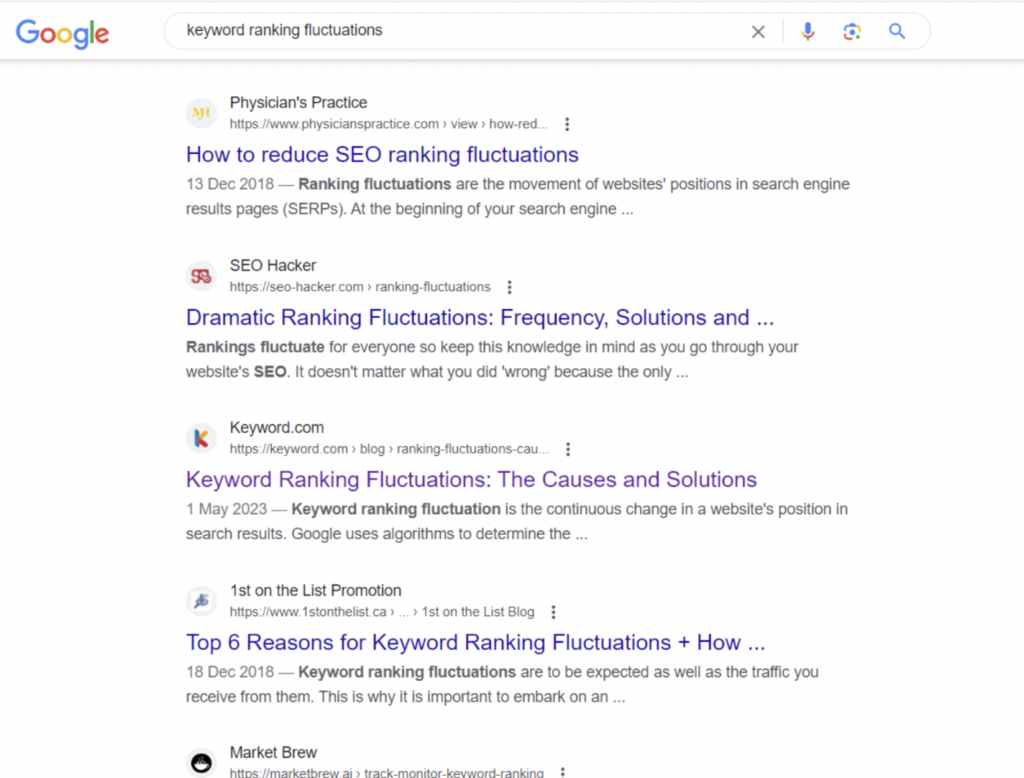Who are your actual SERP competitors?
In this article, we’ll help you discover your top SERP competitor rankings and ways to outperform them.
Let’s start by showing you how we targeted the “organic search presence” long-tail keyword.
If you search for this query on Google, you will find our site on the first page, but we are not the only site shooting our shot. Other sites are ranking for this keyword include:

Simply put, your SERP competitors are websites that appear in the same search engine result pages as your website for specific keywords or search queries.
But wait …
Your SERP competitors may vary depending on the following factors:
1. The Keywords and Phrases You’re Targeting
Our SERP competitors for the long-tail keyword “increase search visibility” differ from those for the keyword “keyword ranking fluctuations.”

And …

Focusing your attention on outranking the competitors for only one keyword is like shooting into the air; you end up with zero results. The scope of your SERP competitors is as large as the number of keywords you target.
2. Target Audience
Your target audience’s preferences, needs, and search behavior influence the keywords they use to find information, products, or services. When you optimize your website or content for specific keywords, you compete with other websites that target the exact same keywords.
3. Geographical Location
The location significantly influences the result pages for a search query.
In a statement released by Google, they said: “When you search on Google, like with Maps, Search or Google Assistant, your current location is used to give you more helpful results. For example, if you search for coffee shops, you’re likely searching for coffee shops near you. Your location helps to show you nearby results, even if you didn’t include a location in your search.”
For example, a user in South Africa searching for the best ranking tracking tools may have a different result than another user searching in the United States.
The location where you are searching Google affects the results you see.
That’s why most SEO tools require that users input their preferred location in keyword research.
Feel free to check out our relevant guide on how to see Google search results for other locations to learn about ways to compare different results.
Related:
All about SERP snapshots and Google’s Search-Generative AI
The Difference Between SERP Competitor Ranking Analysis and Standard Keyword Tracking?
Imagine athletes in a race ignoring their competitors and focusing only on their progress (we’re sure you know what will happen). Even though rank tracking can help you measure the impact of your SEO strategies, you need a consistent competitor analysis to check what is working.
SEO goes beyond analyzing your strategies.
You must examine what your competitors do over time and come at it with a new angle to trigger better results. Besides, adding your competitors’ successful strategies to yours improves your site’s overall growth.
Let’s examine a few more points:
1. Gauge the Competitive Environment
SERP competitor ranking analysis helps you discover other sites in the race to gain visibility for your keywords. Also, it brings you back to your planning desk to adjust or improve your strategy.
Authoritative SERP competitors will require a better approach to outrank them.
2. Insights into New SEO Strategies Based on SERP Competitors
SEO is a world with fragments of strategies.
There is something others are doing to produce better results that you are ignoring.
And that’s where SERP competitors analysis comes in!
Shane McEvoy, Marketing Specialist at Flycast Media, says, “Monitoring SERP competitors offers insights into your competitors’ SEO strategies, allowing you to reverse engineer their tactics and adopt what works for them.”
Cody Bollerman, Owner of codybollerman.com, also says, “SERP competitors yield more data and insight than simply tracking generic keywords stripped of URLs. Why? You can watch what competitors do over time and deploy what’s working within your strategy. You may notice a competitor is now rankings categorically very high after they launched a live chat feature or redesign. You can reverse engineer what is working and ‘close the gap’.”
3. Identifying Content Gaps
Content is how we reach our audience, sell our products and services, and increase brand visibility.
Search engines revolve around content. So the more you produce high-quality content following search engines’ requirements, the better your ranking and visibility.
Again, content is a pivotal medium to communicate value to your audience in building a reputable brand. But how do you get more relevant content ideas your audience is looking for?
SERP competitors analysis!
You see keywords and content with more traffic and engagements you aren’t targeting and then replicate a better version on your site.
4. Backlink Analysis
You discover a competitor’s backlink sources and potential link-building opportunities by analyzing your top SERP competitors’ backlink profiles. More so, you can find sites linking to their pages and reach out to them to link to similar pages on your site.
Neil Patel shares in one of his backlink-building strategies videos, “One of the ways to rank number one on Google is to analyze who is linking to three plus of your competitors and not you and reach out to them. If someone is willing to link to not one, not two, but three of your competitors, chances are that if you ask them for a link, they will probably link to you as well.”
How to Find Your Top SERP Competitors
1. Start with Keyword Research
Keyword research is the foundation of a successful SEO campaign. And discovering your top SERP competitors starts with keyword research.
You must identify keywords relevant to your brand by optimizing different keyword research strategies. You can also expand your keyword list using tools like Google Keyword Planner to find more suitable terms.
You should create a list of keywords you want to target and keywords already covered in your site.
2. Analyze Search Engine Result Pages of SERP Competitors
Search engine result pages are the primary platform to get a list of your SERP competitors.
The next step is to enter the keywords individually and check the site ranking on the first page for these keywords.
Search Engine Journal tags this process as “analyzing the top of the food chain.”
In addition to analyzing the result pages, consider sites that show up for featured snippets, paid ads, and the People Also Ask segment.
For example, we decided to find our top SERP competitors for one of our targeted keywords, google sheets for SEO, by studying the SERPs. Here is the final result (in no particular order):
| Keyword | Top SERP Competitors |
| Google sheets for SEO | Smart Insights |
| Search Engine Journal | |
| Search Engine Land | |
| WordLift | |
| Sheets for Marketers | |
| SemRush | |
| Marketing Insider Group | |
| Ahrefs | |
| Reportz | |
| Keyword.com |
Note: Any website willing to pay for visibility for the same keyword as yours is also a competitor. Again, checking the People Also Ask segment shows related terms your competitors are targeting.
Once you have your list of competitors, head straight to examining how they create their content with purpose and intent.
3. Using SEO Tools
SEO tools are goldmines. Most importantly, they ease you off the stress of manually discovering and analyzing your top competitors.
You can quickly discover your top SERP competitors instantly with a single click.
More so, many SEO tools have an SEO competitive analysis or a Share of Voice feature where users can input their keywords and automatically get a list of their top SERP competitors.
For instance, Keyword.com has a Share of Voice feature that helps you discover your actual SERP competitors before they outrank you, examine their strategies, and what made them rank.
How to Find SERP Competitors With Keyword.com
- Go to Keyword.com and sign up for an account.
- Enter your site’s URL in the URL box.
- Enter the keyword(s) to track. Interestingly, keyword.com automatically provides a drop-down of suggested keywords related to your initial keyword to improve your content quality. (Note: You can input your keywords manually or upload your list of keywords.)
- Give the tool a moment to extract your data. After a while, keyword.com provides your keyword rankings on SERPs. If you input multiple keywords, the first result page shows the number of keywords ranking in the top 3, top 10. top 20, and top 100.
- Proceed by clicking the overview segment to examine the top sites on Google with the highest Share of Voice for your keyword. The time graph shows each site’s ranking progress over time. You can maximize the filter by changing the timeframe to 365 days for better analysis.
- You can highlight one competitor and analyze its Share of Voice with yours.
Keyword.com doesn’t just analyze your competitors but provides a strategic view of your SEO efforts. Sign up for a trial – No credit card required.
Let’s wrap up with a few tips to outrank your competitors.
Strategies for Outperforming Top SERP Competitors
1. Analyze Your Competitors’ Strengths and Weaknesses
To outperform your SERP competitors, you need to know the strategies they are optimizing and the gaps to outrank them. It all boils down to identifying content quality and relevance gaps, evaluating their site’s user experience, analyzing their backlink profiles and authority, and more.
2. Develop a Comprehensive SEO Strategy
After analyzing competitors, you need to use their strategies to develop a comprehensive SEO strategy that quickly drifts them off the track.
You can improve your on-page optimization, enhance your site’s speed and mobile friendliness, create high-quality and engaging content that follows Google’s E-E-A-T update, and more.
In simple terms, create an SEO strategy that ideally revolves around the standard ranking factors.
3. Build a Strong Backlink Profile Thank Your SERP Competitors
In one of Backlinko’s blog posts, they said, “Google and other major search engines consider backlinks “votes” for a specific page, thus indicating relevance, quality, and authority to the web page. Pages with many relevant backlinks tend to have high organic search engine rankings.”
An analysis by Monster Insight shows that webpages with fewer backlinks get much less organic traffic because they are buried deep in search results.
Building strong backlinks enhances your site’s authority and signals to search engines that your pages are relevant, which boosts rankings.
A crucial tip to building your backlink profile is creating link-bait content, i.e. content worthy of linking to. These types of content are so valuable that other sites can link to it.
Also, you can reach out to authoritative sites linking to your competitors and request that they link back to you.
4. Monitoring and Adapting to Changes in SERPs
4.1. Staying Updated with Algorithm Changes
Experts estimate that Google updates its algorithm around 500-600 times yearly. However, some updates impact the general SEO landscape, while some don’t. For instance, the helpful content update improved the algorithm and the all-around SEO game.
But how do you respond to core updates?
Don’t dive into the river when the wave is intense.
Search results might bounce around for a few weeks.
That’s why a blog post by Search Engine Journal recommends allowing the search results to settle down before trying to make sense of it.
4.2. Tracking Keyword Performance
The last step is to track your keyword rankings on search engine result pages.
Rank tracking helps you measure your SEO strategy’s success and areas of improvement.
Sites that fly high on SERPs measure their SEO success rate and optimize relevant tips to outrank their competitors. For a better result, you can use a SERP tracker like keyword.com to accurately monitor your keyword positions and get insights to outsmart your competitors.
This tool’s keyword SERP tracking saves you the time spent on manual keyword tracking with detailed keyword performance and daily updates, giving you an edge over fluctuations.
Interestingly, Keyword.com is a suggestions tool that provides a list of keywords you are ranking for but not tracking and related keywords you can use to optimize your content perfectly.